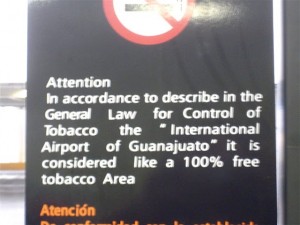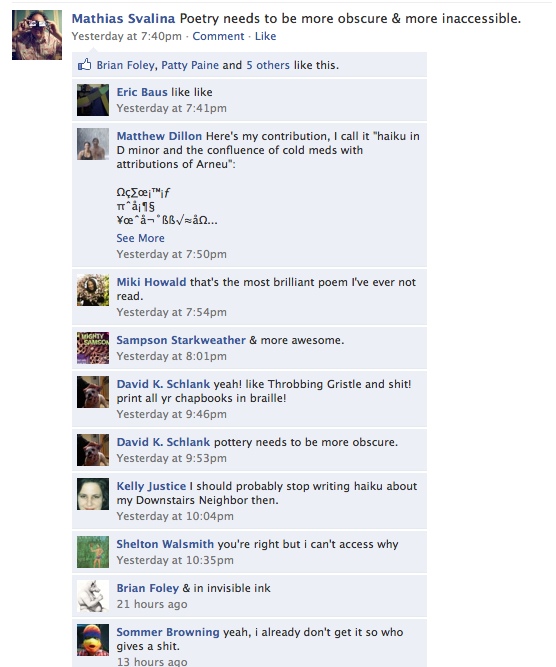I Don’t Want to Want to Win: A review of Mathias Svalina’s Wastoid

Wastoid
by Mathias Svalina
Big Lucks Books, 2014
166 pages / $12 buy from Big Lucks Books
John Berryman wrote in a letter to Allen Tate, “I don’t write these damned things willingly, you know,” an exclamation that fits the vertiginous, character-addled world of The Dream Songs. Certain writers demonstrate this possessive spirit effortlessly, and Mathias Svalina fits in among them in perfectly discordant harmony. Wastoid, his latest collection from Big Lucks Books, has crawled inside the desiccated body of the Sonnet and formed an impenetrable shell from its remains. Like The Dream Songs, Svalina absorbs the personal into a visionary metamorphosis of the real. They both discard tight form to maintain the bare mechanisms of the sonnet. In Wastoid, men swamp to and from the path to gaze into mirrors, open doors into other doors forever, tell their shitty dads to fuck off, and eviscerate themselves to gift themselves to the lover.
Early on, Svalina gives us two aesthetic choices—substance or form—on how to “tame the unrammable will,” a nod that feels self-conscious, an impossible promise. The unrammable will, like Berryman’s immutable drive for substance and form, is a concept that gains traction from isolation. And isolation, more than in any other poetic form, carries a potent smell in the sonnet. While I don’t want to convince anyone that this early moment is manifesto’s sneaky thread, it points to a duality that is signature in these poems, a duality also signature for the sonnet. The lover is the volta sluicing the flood, spilling the guts, trapping the speaker between water and whale. Any other feature of the sonnet falls to the wayside, because, in this heightened realm of lovers all called “Wastoid,” it is only the slaughter of arguments that count for anything.
Most of the poems organize themselves around the lover’s growing imperialism, fame, opposition, deterioration. Pick your poison, the lover seems to say, as their agency bloats into objects while the speaker flattens under the power of decorum, becoming more and more corporeal. The lover is an obstacle when the speaker is crushed beneath doors. The lover is a window when the speaker is only skin. The lover is a trampoline when the speaker is a “canyon killing a praying man.” The lover is a tinfoil quilt when the speaker splits into two writers. Steeped in the logic of the poems, such declarations make perfect sense. We know that the subject-predicate is at war with itself, and the battle is pathetic and terribly effective. Take this poem in full:
In “Dreamsong 88: Op. posth. no. 11,” Berryman concludes “I didn’t hear a single word. I obeyed.” We understand authority to work similarly in Wastoid. We are not made complicit to the laws of Svalina’s verse, though they circle in curious carousel around a central heartbreak. If there are laws, they exist in a trail of essentialized anguish: As above, “There are so many things that command the attention of men”; elsewhere, “To immerse oneself in another man is to become a contraption,” “It is fear that makes the world so solid,” “Even marvelous things can be effortlessly forgotten.” Most poems carry similar assertions. Svalina ballasts his domestic and nautical imagery with accessible phrases like these, and through this negotiation of reason and landscape do we find ourselves clasped entirely in his spell.
Nobody in any relationship ever wins, though the heroic sonnet might masturbate itself into a frenzy of false victory. This is how the poet obeys. Shakespeare said in one of his sonnets to a young dead boy, “For having traffic with thyself alone / Thou of thyself thy sweet self dost deceive.” Gross, Shakespeare, pull yourself together. Svalina is as alone when he writes, “I spend most of my day in the office looking at porn. In porn love is always demonstrated: one man comes on another man’s face. One man comes on another man’s face—it is like forgiveness and the photographer is the priest.” Svalina deconstructs his loneliness in these banal settings, fuses it with other more wild lonelinesses so both can resist forgiveness, pornographic or fatalistic or otherwise. Always there is a sense that to say anything is to say every version of its self-destruction:
Svalina is not afraid of the more Romantic imagery associated with the sonnet because of the ease of dismantling it: Time, Light, Hearts, Nature/Naturer, Blood. They exist in the same terrain as Home Depot parking lots, bear genitals, and the Chicago Manual of Style. The lover transforms only when these essentialized ideas of Time and Light and Nature touch this other suburbia. Sometimes, the lover is cruel, a result of the trope out-troping the trope. Sometimes the lover feels like Prince and we can’t hate him because he sings against the insect stings and horses, “I want to be your brother / I want to be your mother and your sister too / There ain’t no other / That can do the things I’ll do to you.” In either case, this is a book chock full of men, writhing and fucked inside a place that can no longer writhe or fuck. Out of the heavily guarded images, we are given these manic parables of disorder. The men roam forever sick inside the seasons of this disorder. It has been a long time since I’ve been this excited about a book made exclusively of men. Svalina can’t help but expertly turn phrases inside out, resolve to find their invisible meanings. Each poem is its own collection of poems, its own annihilation of his collection of poems. Like men they have the power to deny or condemn as they have the power to enable and motivate further. The simple quiet of his wasted world goes on and on: “The ATM screen tells me press enter to exit. I must enter to exit.”
***
October 16th, 2014 / 10:42 pm
“as a human being living amidst a civilization’s collapse”: Mathias Svalina talks about his new book & gives away money

I’m pleased to present the following interview I conducted with Mathias Svalina, author of one book of poems, Destruction Myth (Cleveland State University Poetry Center), & one book of prose, the newly released I Am A Very Productive Entrepreneur (Mud Luscious Press).
To celebrate the release of I.A.A.V.P.E., Mathias has decided to give away money.
One dollar to be exact, but a very special dollar…
To win, post a word from the dictionary in the comment box below. Mathias will randomly select one of the words as the winning word. To the writer of the winning word, Mathias will write a unique business plan on a dollar bill, which the winner can then showcase (or spend) to commemorate their first dollar earned.
Contest ends Friday at noon.
I Am A Very Productive Entrepreneur (2)
 I Am A Very Productive Entrepreneur
I Am A Very Productive Entrepreneur
by Mathias Svalina
Mud Luscious Press, 2011
67 pages / $12.00 Buy from Mud Luscious Press
Rating: 8.0
Mathias Svalina’s I Am A Very Productive Entrepreneur has a very simple conceit: in a series of vignettes, an entrepreneur describes the outlandish businesses he’s started, and, occasionally, their reasons for not working. Thus, we learn of enterprises to turn everything into gold, to put blond hairs on the pillows of single men, to allow children to remain children forever, to retrofit memories with pilot lights and to slip old notes inside of used books by invisible employees.
August 23rd, 2011 / 12:17 pm
I Am A Very Productive Entrepreneur
 I Am A Very Productive Entrepreneur
I Am A Very Productive Entrepreneur
by Mathias Svalina
Mud Luscious Press, 2011
67 pages / $12.00 Buy from Mud Luscious Press
Rating: 8.7
When I received Mathias Svalina’s novella, I Am A Very Productive Entrepreneur in the mail, I didn’t quite know what to expect. I tore open the padded manila envelope and found myself staring at a green and orange cover with the words “a novel(la)” printed on it. Ok. Then I did a preliminary flip through of the book and didn’t see a novella at all. The book seemed to be filled with short poems, prose poems and pieces of what some would call flash fiction. Ok. I was hoping the book wasn’t going to be some failed attempt at “experimental fiction.” But, coming from Mud Luscious Press, I wasn’t exactly surprised that this book was, at first impression, well, weird. J.A. Tyler and his Mud Luscious Press have been putting lovely oddities into the world for a few years now, and I Am A Very Productive Entrepreneur stayed the Mud Luscious Press course, and did not disappoint.
August 18th, 2011 / 12:44 pm
Round this–
A new major book review section is about to open, at… the Wall Street Journal?
Jeff T. Johnson’s got an essay on “The New Hybridity” at Fanzine.
Castro thinks Ahmadinejad should stop slandering the Jews. You can add that to the list of things Castro and I agree about.
Mathias Svalina has been writing Book Proposals for Broadway Books. From “My Year on a Moving Sidewalk”:
This book will be popular among readers who enjoyed such books at Mary Roach’s Stiff, Mary Roach’s Packing for Mars & the City of Portland, Oregon’s downloadable pdf “SIDEWALK REPAIR MANUAL: How to Repair and Maintain a Sidewalk.”
Bianca Stone has a new chapbook coming out. Someone Else’s Wedding Vows is now available for pre-order from Argos Books.
Tender, imaginative, wry and wise, the poems in Stone’s first collection take the reader from the bottom of the ocean to the orbit of the moon. In between, the geography of the heart is mapped lyrically and unexpectedly.
Not a lot to complain about in that description, is there?
At the Faster Times, Kyle Minor absolutely loses his shit over Amelia Gray’s Museum of the Weird. I stopped pretending I could follow what he was talking about somewhere toward the middle, but the upshot seems to be that he likes her book very, very much.
And finally, as if you needed me to tell you, the launch event for Richard Yates is at BookCourt tonight. It begins in about ten hours, which means that I am going to leave my house in a few minutes to head down there and claim a seat.
2 new from Brave Men
Wantttttt…
Now Available for purchase from Brave Men Press
front
THE BLACK EYE
Brian FoleyBrian Foley has had poems appear or are forthcoming in Typo, Fou, Glitterpony, No Tell Motel, Sixth Finch, and others. He edits SIR! Magazine and was recently selected by Pam Rehm for the Academy of American Poets prize. He lives in Massachusetts where he attends the MFA for Poets and Writers at Umass Amherst.
Cover is letterpressed with black ink on red paper.
Printed in a limited edition of 150.
22 pages.$9
GIANT Review: Mathias Svalina’s Destruction Myth

Published by Cleveland State University. $15.95, 83 pages.
[NOTE: The author of this review discloses a high personal regard for the author of the book under consideration.]
The first forty-four of the poems in Mathias Svalina’s Destruction Myth are called “Creation Myth”—that’s all of them except the very last one, which happens to be the title poem. It would be easy enough, and also probably correct, to read deeply into the title, locate there the thematic and/or philosophical and/or theoretical matrix that centers and informs the work. One could go off on the whole thing about how all creation is in some sense a destructive act (even ex nihilo creation requires a rending of the nothingness that exists prior to thingness), or, better still, how even as creation is ongoing and ever-renewing, we can never escape the essential fact of destruction: the limitless variety of creation, for all its glory, can never not be overshadowed by the singular fact of destruction, the final and re-unifying change that awaits us all. But to be perfectly honest, I’d rather not get into it, because there are few things duller than diligent, well-intentioned exegesis, and a book as big-hearted and bonkers as this one deserves better.
January 25th, 2010 / 12:31 pm
Mexican Getaway with Julia Cohen & Mathias Svalina
 All poetry power-couples should be required to have dueling(/dualing) blogs. As JC has mentioned on her blog before, her parents are retired to sunny Mexico, and so she and MS went down from Denver to spend the holidays in the not-snow. His slideshow is here. Hers are here, here, and here. Also, his new (debut full-length!) collection, Destruction Myth, and her chapbook, For the H in Ghost.
All poetry power-couples should be required to have dueling(/dualing) blogs. As JC has mentioned on her blog before, her parents are retired to sunny Mexico, and so she and MS went down from Denver to spend the holidays in the not-snow. His slideshow is here. Hers are here, here, and here. Also, his new (debut full-length!) collection, Destruction Myth, and her chapbook, For the H in Ghost.
Here are photos they took of each other.


Oh, and here’s Mexico-

Good deal.
Mathias Svalina’s The Hospital, by Nathan Young
This beautiful little collage video is a section of Mathias’s book-length poem Above the Fold. Another section is available as the chapbook The Viral Lease from Small Anchor Press. Feel that.



